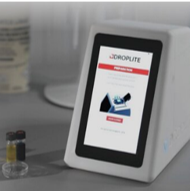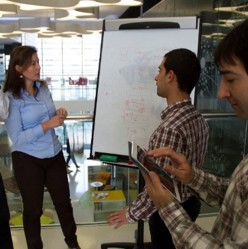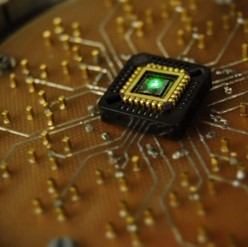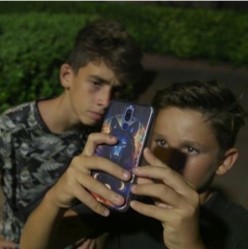ICFO decide game
Group 5 – Participant 5
Story cards
Read all the cards from this category, choose the one that looks more interesting to you and explain it to the rest of the group.
ISIDORA ISIBARNE
Story Card 2
I work for a company that designs and builds lasers: we make small ones, like the pointers you can buy in the neighborhood store, or industrial lasers that can accurately cut all kinds of material or even weld metals.
I really like my job because our products can meet the very different demands of our customers: there are some that need extreme precision to be able to manufacture the microcircuits that are inside our smartphones and tablets, and others that require high power to weld the components of a car or make incisions in pistons of aircraft engines in a precise and reproducible way to increase their efficiency.
photonics everywhere
Jun jiang
Story Card 6
I wore glasses since I was a kid and I always wanted to be like my friends who could play sports and go to the pool without having sight problems. Two years ago I was able to have eye surgery to reduce my myopia and I can finally see the world directly and not through my glasses! And all thanks to the photons of an ultra-precise laser that allowed the surgeon to make incisions in my eyes with minimal risk.
health
gerard grau
Story Card 15
This year I started the master's degree in Photonics in Barcelona. In one of the subjects, I discovered that photonics has a lot to do with my other passion: drones. If we fill these small planes with photonic sensors, we can get valuable information about places that would be difficult to reach. This makes drones not just fun toys, but important tools for studying the environment, searching for oil, gas, or mineral deposits, monitoring areas of natural disasters or crops.
information and cYberseCuriTY
info cards
Read all cards from this category, choose the two that look more interesting and explain them to the rest of the group.
A laboratory in a chip
Info Card 5
For a blood test, we have usually to go somewhere where they fill several tubes with our blood and we then have to wait a few days for the results. Thanks to the effective interaction between photons and gold nanoparticles, a blood analysis laboratory can fit inside a chip of a few centimeters that allows us to obtain the results in just 10 minutes from a single drop of blood.
This technology developed by Droplite (an ICFO spin-off company born in 2018) is currently validated to detect hormones linked to the reproductive cycle, allergies, antibodies for some veterinary or human diseases (such as malaria and COVID-19), but it has many other potential applications.
Photo: Prototype by Droplite
health
knowledge and technology transfer
Info Card 8
ICFO puts the maximum effort in transforming the knowledge generated there into a positive impact on society in the form of products and technologies in collaboration with the industry or through the creation of spin-offs.
ICFO has obtained more than 100* patent families in the fields of health, information and energy. These include innovations in microscopy and optical manipulation, nanotechnology devices, solar cells, graphene sensors, laser systems, advanced displays, 3D printing, wearable devices, quantum technologies and compact sensors for use in hostile environments.
ICFO has surrounded itself by an ecosystem of companies with which it collaborates in different industrial projects, many involving its 9* spin-offs and as well as others still in the incubation stage.
(*) data updated on October 2020
photonics everywhere
graphene, a material with a great future
Info Card 11
Graphene is the first 2D material to be manufactured in the world. Despite being only one atom thick, graphene is stable and surprisingly strong. Its physical properties make of it an excellent conductor of heat and electricity, as well as being flexible, extensible and transparent. All these characteristics make graphene a very interesting material for the development of new technologies.
Institutions are aware of the potential of this material and have created the Graphene Flagship (at the European level) and GraphCAT (at the local level) to accelerate research on this material and bring its benefits to society. ICFO employs some of the world's leading experts in the field of graphene, participating in many of the projects of these two networks.
Photo: Graphene-based broadband camera designed by an ICFO team
photonics everywhere
citizen science
Info Card 23
ICFO encourages society to be part of the scientific community through rigorous scientific experiments that require citizen participation, making society aware of the importance of science in an attractive way, and enabling everyone to significantly contribute to scientific research.
In recent years, ICFO has coordinated various citizen science experiments, such as the BIG Bell Test, involving more than 100,000 citizens in a series of cutting-edge quantum physics experiments conducted in 12 leading laboratories around the world. It also organized NightUp Castelldefels, a pilot experiment to test whether we can use the sensors in mobile phones to gather useful data for studies on light pollution.
Photo: Citizens participating in NightUp Castelldefels.
photonics everywhere
thinking cards
Read all the cards from this category, choose the one that looks more interesting to you and explain it to the rest of the group.
fake news
Thinking Card 7
In order to express critical opinions about the news that we receive through the media outlets, advertising, social media... and avoid falling into scams or misunderstandings, it is important to keep up-to-date about the latest news in science and technology. Sometimes, however, the information comes from pseudoscientific sources of dubious reliability.
How do we handle this often questionable flow of information?
in person or virtual?
Thinking Card 16
Conferences are the perfect opportunity for scientists to share their work with colleagues around the world, exchange ideas, and establish new collaborations.
In recent years, the climate emergency has begun to open the debate on whether travel should be reduced in favor of virtual events, which do not allow socialization and bonding to occur naturally as in a in person conference.
The 2020 pandemic has accelerated this debate: should scientific meetings be in person or virtual?
DECISIon
The time and resources available to solve important problems affecting society are limited. Imagine being part of the commission that has to decide how to invest the money for photonics research at European level for the coming years: knowing that photonics benefits society in many different ways, how would you distribute funds among the different research fields in photonics?
This is not an individual decision: each group must come to a unanimous conclusion by discussing correctly and rationally based on the facts that you have learned so far. There is no right or wrong answer. Like many things in life, it depends on the point of view you assume, the priorities you set, ...
light for health
Option 1
The pandemic that arose in 2020 taught us that public health is an important sector that affects many more aspects of society. A tiny virus can affect the lives of millions of people in all its aspects, not only health, but also the economy, industrial structure, labor market ...
That’s why it’s important to focus most of our efforts on research projects that can improve and care for people’s health.
light for information and cybersecurity
Option 2
We live in the information age. More and more companies and institutions are collecting and analyzing large amounts of data to improve industrial processes and services for the population. In addition, digital technologies are essential to communicate with each other, whether for work or fun. If information systems fail, strategic structures such as energy networks, traffic control, hospitals, governments, etc. fail, too. Thus, ensuring data security for quick and massive data transfer is of fundamental importance for a digitized society like ours.
That is why it is important to focus most of our efforts on research projects that can improve data collection, analysis, transmission and security.
light for energy and the environment
Option 3
We are in the middle of a climate emergency: to be able to solve it we need new environmental policies and the commitment of society as a whole. Science and technology can accelerate the change of paradigm that we need to save the planet with discoveries and innovative technologies. If we do nothing now, the Earth will be uninhabitable and unsustainable, but there’s still time.
That’s why it’s important to focus most of our efforts on research projects that can help us take care of our planet.
photonics everywhere
Option 4
Photonics is everywhere and has a positive impact in many different aspects of our lives. Sometimes, the same technology (such as the laser) can improve health, information and care for the environment at the same time. There are many global issues and it is difficult to set a priority, especially because they are interconnected.
That’s why it’s important not to focus our efforts on a single field of application: it’s better to diversify our efforts to have more chances of success.













